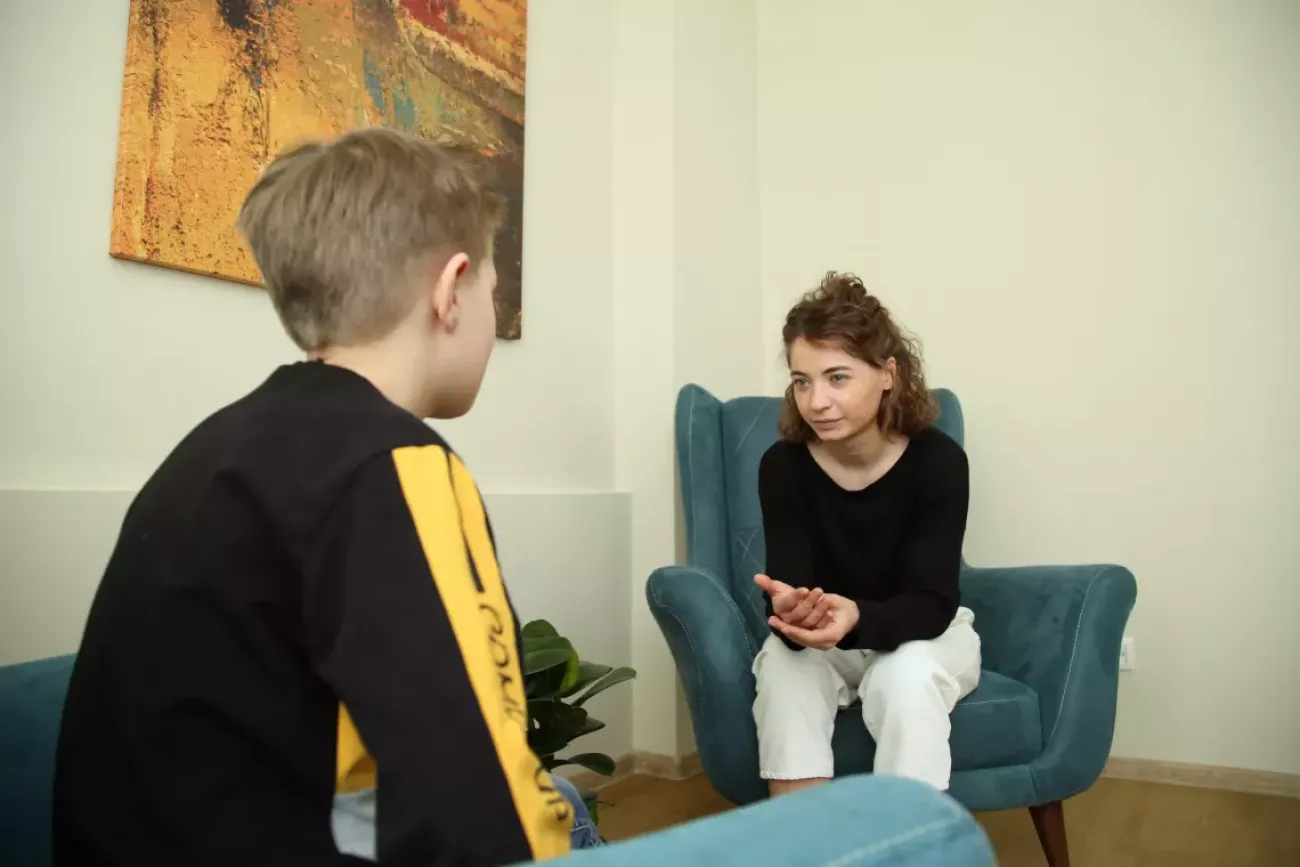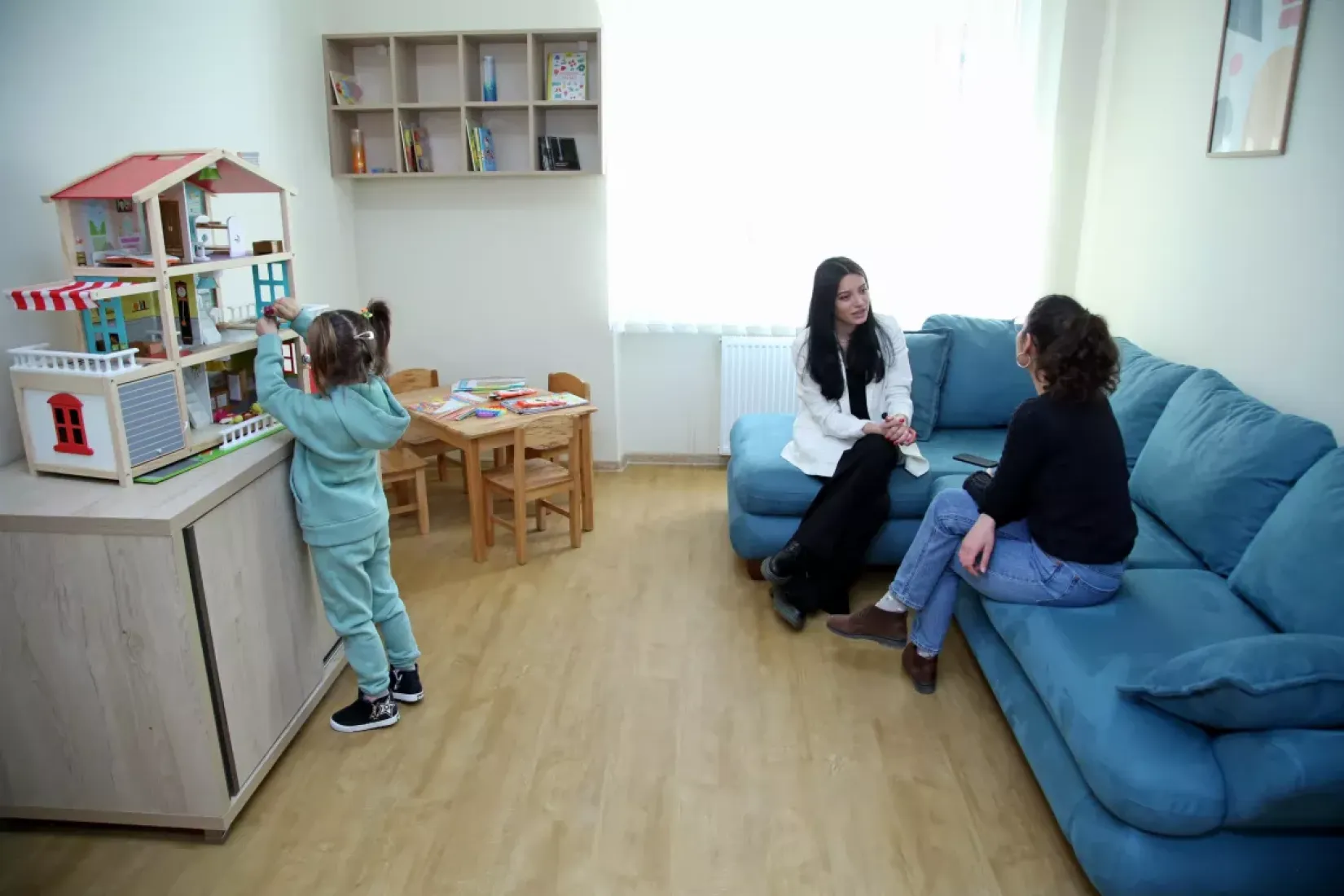Georgia embraces ‘Barnahus’ model for child abuse victims

Center for Psychological and Social Services for Children
When 12-year-old Anna* told her mum, Natia, that a neighbor had sexually abused her, Natia, angry and heartbroken, knew she had to report it.
But she dreaded what might come next. Natia didn’t know how the system would deal with Anna. She pictured her daughter having to face endless interviews, interrogations, medical tests and forensic checks — being forced to recount and relive the trauma over and over again in unfriendly police stations and clinics.
When Natia spoke with the police, instead of inviting them to the police station, they asked her to take Anna to the Center for Psychological and Social Services for Children, a new flagship center in the Georgian capital of Tbilisi that has already helped more than 200 child victims of sexual abuse.
The center and its experts are trained and experienced in dealing with child victims of sexual abuse in a way that minimizes the pain that investigations can cause and, crucially, provides a therapeutic environment and psychological services so that children can process, deal with and ultimately overcome their traumatic experience.
“If a child does not get the right kind of treatment, they can be more traumatized by the investigatory process than by the event itself,” says Nona Tsikhelashvili, a child protection officer with UNICEF Georgia.
“Children get all the support they need under one roof and don’t need to go from one agency to the next. The environment is warm, friendly and more welcoming, it serves their best interests,” Tsikhelashvili adds.
The center is based on the “Barnahus” model, which has transformed how care agencies work with child victims of sexual violence across the Nordic countries and much of Europe, and is a first of its kind in Georgia.
“Barnahus” — from the Icelandic word for “children’s house” — brings all the services, specialists and experts that are involved in cases of child sexual abuse, from investigators and doctors to psychologists and social workers, into one place. It puts child welfare at the heart of the response.
Instead of children facing multiple invasive interrogations by officials more used to dealing with adults, a single trained expert guides victims through any necessary medical and forensic checks and conducts a softer, age-appropriate interview. That helps secure testimony for the investigation and ensures the child can start to recover.
“It’s a child-friendly way to ensure that the truth comes out,” summarizes Bragi Gudbrandsson, a member of the UN committee on the rights of the child and pioneer of the first Barnahus center, launched in Iceland in 1998.
The wrong response for dealing with children who have been abused can aggravate the trauma, increasing the potential for lifelong harm.
The Barnahus approach starts with the physical building itself.
The Tbilisi center is furnished to be as welcoming as possible — warm rooms, comfortable armchairs, children’s toys and books. Far away from intimidating police stations or hospital waiting rooms.
“The house is a symbol of a warmth that the child needs to be embraced in order to be able to tell his or her story, which can be hard on the child, traumatic on the child,” adds Gudbrandsson, who visited Georgia to share his experience with those working in the center.
When Anna and her mum arrived at the center, a social worker and a psychologist met them outside, explained the whole procedure and showed them around.

The psychologist used this time to determine whether Anna was emotionally ready to discuss what had happened in more detail and assess what kind of long-term rehabilitation she might need. When Anna felt up to it, a specialist investigator trained and experienced in working with children victims of sexual violence sat down with her to talk through her experience.
In the Barnahus model, instead of a child being interviewed by different agencies, all the relevant bodies submit questions to one trained professional. They conduct a streamlined interview in a way that can gather information and answers for the investigation, but does not force a child to relive or re-experience the events in a way that can do serious harm.
The interviews can be broken up to play games, go for a walk, read a book or take lunch whenever the child wants to. If it becomes clear that the child needs a medical check, this typically takes place afterwards, with their consent.
Research has shown it’s a win-win approach.
For the children, the interview process — which evidence shows can amplify the traumatic effect of the abuse — is minimized and the conversation is as much about starting the recovery as it is gathering information.
For investigators, the method can improve criminal justice outcomes by securing more open and reliable testimony from children who find it easier to talk in a more relaxed environment.
“The people working here are much more specialized in these kinds of cases and they know how to talk to different children in an age-appropriate way. That helps the children be less stressed and they can be more open throughout the process,” says Tsikhelashvili.
The center’s commitment to children’s welfare also covers long-term recovery needs.
All children are offered therapeutic services and qualified experts are on hand to provide appropriate treatment and follow-up sessions for as long as needed.
“The therapists at the Barnahus are all mental health professionals and are trained in trauma focused therapy,” says Tsikhelashvili.
That extends to families as well, with psychological support and family therapy available to help deal with a difficult, often traumatic, period that can affect many people, not just the direct victim.
A few months after Anna came to the center, her social worker has seen big progress.
She is now better able to manage her anxiety and less likely to blame herself for the abuse. She is happier and more confident opening up to people she trusts and can better judge potentially dangerous situations and ask for help.
Run by the State Care Agency and launched in 2022 with the support of UNICEF and the Government of Estonia, the center in Tbilisi currently works with children from the Georgian capital and the surrounding regions, though there are hopes to roll-out new locations.
Jesper Moller, UNICEF Representative in Georgia, says the Center is part of UNICEF’s “commitment to the well-being of every child.”
“We extend our deepest gratitude to the Government of Estonia for their steadfast support in this vital endeavor. We look forward to seeing the model and its approaches expanded to other regions of Georgia, so that children, victims of all types of violence and crime throughout the country, have access to the services they need,” he said.
"The Center for Psychological and Social Services provides a unique opportunity for state agencies to protect children from re-traumatisation and ensure access to justice tailored to their needs. Barnahus in Georgia has proven to be a crucial psycho-social rehabilitation service for child victims of sexual violence. This progress would not be possible without the support of UNICEF and the Government of Estonia, for which the Government of Georgia is highly grateful.
"The State Care Agency acknowledges the need to expand the service's geographical accessibility. We are actively working to establish a second centre in Kutaisi, Western Georgia, in the near future" - says Rusudan Kokhodze, Head of the Agency for State Care and Assistance for Victims of Trafficking.
*Anna and Natia are composite characters based on multiple testimonies and real cases from the center.
About the Center for Psychological and Social Services for Children
The Center for Psychological and Social Services for Children is a multidisciplinary inter-agency project launched in March 2022 to investigate instances of child sexual violence and abuse, and cater for the victims and witnesses in a child-friendly way. It is led by the Georgian Agency for State Care and Assistance for the Victims of Human Trafficking of the Ministry of the Internally Displaced Persons from the Occupied Territories, Labour, Health and Social Affairs with the support of UNICEF and the Government of Estonia.
Written by


